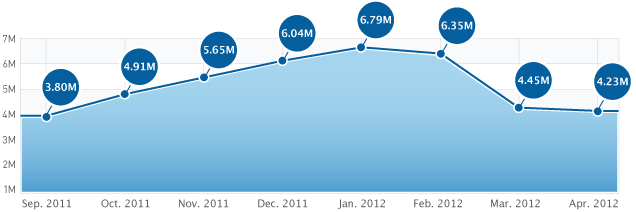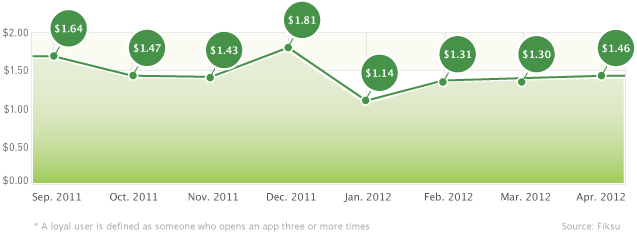Mobile app downloads continued to decline in April and the cost to acquire loyal users picked up, reports mobile marketing firm Fiksu in its latest report out today. This downward trend was expected, as no major events sparked app discovery during the month, explains Fiksu CEO Micah Adler. However, mobile app marketers were particularly aggressive in the social networking and games categories during April, both of which experienced volatility throughout the month. With the former (social networking), the reason had to do with the $1 billion acquisition of Instagram, which drew increased attention to the category. There were also a number of new game releases in April, which led to increased interest and competition among the developer community in that category, as well.
This data comes from the measurements known as the Fiksu App Store Competitive Index, which tracks the average aggregate daily download volume of the top 200 free U.S. iPhone apps, and the Cost per Loyal User Index, which tracks the ever-changing cost to attract loyal users to an app. Fiksu defines “loyal” as people who open and app three times or more. The data is sourced from over 24.9 billion mobile app actions – which includes things like app launches, registrations, and in-app purchases – and more than 357.6 million downloads recorded by apps marketed via the Fiksu for Mobile Apps user acquisition platform.
In April, the App Store Competitive Index, dropped by 4.9% to 4.23 million downloads, which is down from 4.45 million in March, 6.35 million in February and 6.79 million in the first month of 2012. “App marketers continued to scale back their use of robotic install tactics in response to Apple’s policy on third-party marketing services,” said Adler of the drop in downloads.
March saw the biggest decline in terms of the impact of the download bot ban, with a huge 30% drop that month. The drop was in part due to exiting the busy holiday season when app installs spike, but was also due to Apple’s new policy on the use of these automated tactics designed to boost app’s rankings. In February, Apple warned developers to not use services like this to manipulate the chart, saying:
“Once you build a great app, you want everyone to know about it. However, when you promote your app, you should avoid using services that advertise or guarantee top placement in App Store charts. Even if you are not personally engaged in manipulating App Store chart rankings or user reviews, employing services that do so on your behalf may result in the loss of your Apple Developer Program membership.”
Clearly, the impact of the bot ban is still being felt, if perhaps on a smaller scale.
Meanwhile in April, the Cost per Loyal User Index rose by 12.3% to $1.46, up from $1.30 in March. February was practically the same as March at $1.31, a bump up from January’s $1.14. Typically the first quarter is a quieter period for marketers, says Fiksu, so April’s aggressive spending by marketers is not that unusual, especially when combined with the dynamics in the top categories of games and social networking in the month.


